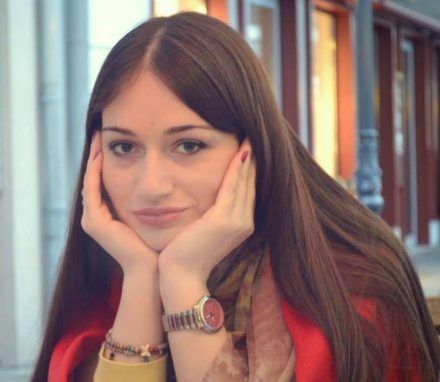The Rights of the Persons with Disabilities in the Penitentiary System
14th April 2020

The blog is produced within the framework of EU-funded project „Monitoring Government’s Commitments and Promoting the Reforms in the Penal Sector through the Engagement of CSOs“ implemented by Penal Reform International together with the partner organizations: Rehabilitation Initiative of Vulnerable Groups and Human Rights Center.
I have been working for the NGO Human Rights Center for seven years and have been studying the rights of convicts in the penitentiary institutions since then.
Although in the penitentiary institutions numerous issues have been addressed by NGOs and the Public Defender’s Office, I would like to highlight the issue on the legal status of persons with disabilities.
S.S. is a probationer, paralyzed below the chest, this time he is resentful on the public and the government because he thinks he has been deprived of the right to treatment, health and simply – to live a normal life. He was serving his sentence in a medical facility, during which his life was in danger several times. Many times there was an expectation that someone would help with bathing or taking care of himself so that he would not be serving his punishment in inhuman and degrading conditions.
S.S. is currently a probationer, has no help, lives with a retired mother, and lacks the chance to leave the country to go for treatment, which would alleviate his pain, and the mother would not have to look at her son’s dislocated spine.
Unfortunately, S.S. is not the only one who has talked to me about the severe conditions in the medical facility. Akaki Tokhadze, who is a disabled person, says that he entered the penitentiary institution completely healthy, but two difficult years of psychological and physical violence had chained him to a wheelchair forever. When we write about the rights of people with disabilities there are standards, one of which is avoiding of the disclosure of the medical diagnosis, but this time, bypassing the standards, I will tell you that Akaki Tokhadze, whose legs are completely paralyzed and hands partially paralyzed, served his sentence in severe conditions.
In a medical facility where disabled prisoners are serving sentences, there is no adapted environment, there are three beds in the cell, which is problematic for people with disabilities, sometimes he could not even move a wheelchair, he could not move freely, but the problems did not end there. Akaki also emphasizes the inconvenience caused by taking a shower at a medical facility and notes that with the help of other inmates, he could change the sit to a chair where other inmates before him were taking a shower. Along with unhygienic conditions, there was a risk that his life would be in danger if the chair swam in the water. Although he could have a caregiver, the number of caregivers in the medical facility was not sufficient and adequate.
Most of the inmates preferred to serve their sentences in a non-medical facility where they would be allowed to go out on the fresh air and escape the walls at least for a while. Akaki Tokhadze noted that prisoners with health problems are more in need of fresh air, but instead they are constantly locked within the four walls.
Although Akaki Tokhadze’s health is deteriorating each year, the law does not envisage his release from prison, his sentence was postponed and if he fails to undergo the medical expertise which costs GEL1500 (Tokhadze is a socially vulnerable person) in June 2020 he will be sent back to prison. Moreover, a similar case occurred in 2019. Tokhadze responds with an irony that the prison can not let him go and constantly trying to bring him back. Due the gaps in the legislation Akaki Tokhadze spins in a vicious circles from one prison to another, then everything starts all over again: expertise, an answer, leaving the prison and again the risk and fear of going back.
According to the report – “The Rights of the Life-Sentenced Prisoners and High-Risk Prisoners in the Prison System”, the United Nations Convention on the Rights of Persons with Disabilities provides the obligation to a State Parties to ensure that in case persons with disabilities are deprived of their liberty through any process, they are, on an equal basis with others, entitled to guarantees in accordance with international human rights law and shall be treated in compliance with the principles of the Convention, including by provision of reasonable accommodation.
According to Nelson Mandela’s rules, the prison administration must reasonably provide housing and other conditions for prisoners with physical or mental disabilities so that they have access to the prison life fully and effectively on an equal basis with others.
To implement the principle of prohibition of discrimination in practice, the prison administration must take into account the individual needs of the most vulnerable categories of prisoners, especially those in the prison context.
According to a joint report by non-governmental organizations, when a decision is made to deprive a person with a disability of liberty, the government should take special care of these individuals to ensure that their detention conditions meet their special needs due to disability.
Despite the recommendations of non-governmental organizations, persons with disabilities are still serving their sentences in degrading conditions. However, they point out that when there is a high public interest in a disabled prisoner, then the prison administration pays special attention to such convicts.
Adapted environment, increasing the number of caregivers in the medical facility, the opportunity to access the fresh air every day, elimination of discrimination – these are the requirements of convicts with disabilities, which will allow them to have full and effective access to prison life on an equal basis with others.
ქართული ვერსიის სანახავად, გთხოვთ, მიჰყვეთ ბმულს: https://www.penalreform.org/blog/%e1%83%a8%e1%83%a8%e1%83%9b-%e1%83%9b%e1%83%a1%e1%83%af%e1%83%90%e1%83%95%e1%83%a0%e1%83%93%e1%83%94%e1%83%91%e1%83%a3%e1%83%9a%e1%83%97%e1%83%90-%e1%83%a3%e1%83%a4%e1%83%9a%e1%83%94%e1%83%91%e1%83%94/